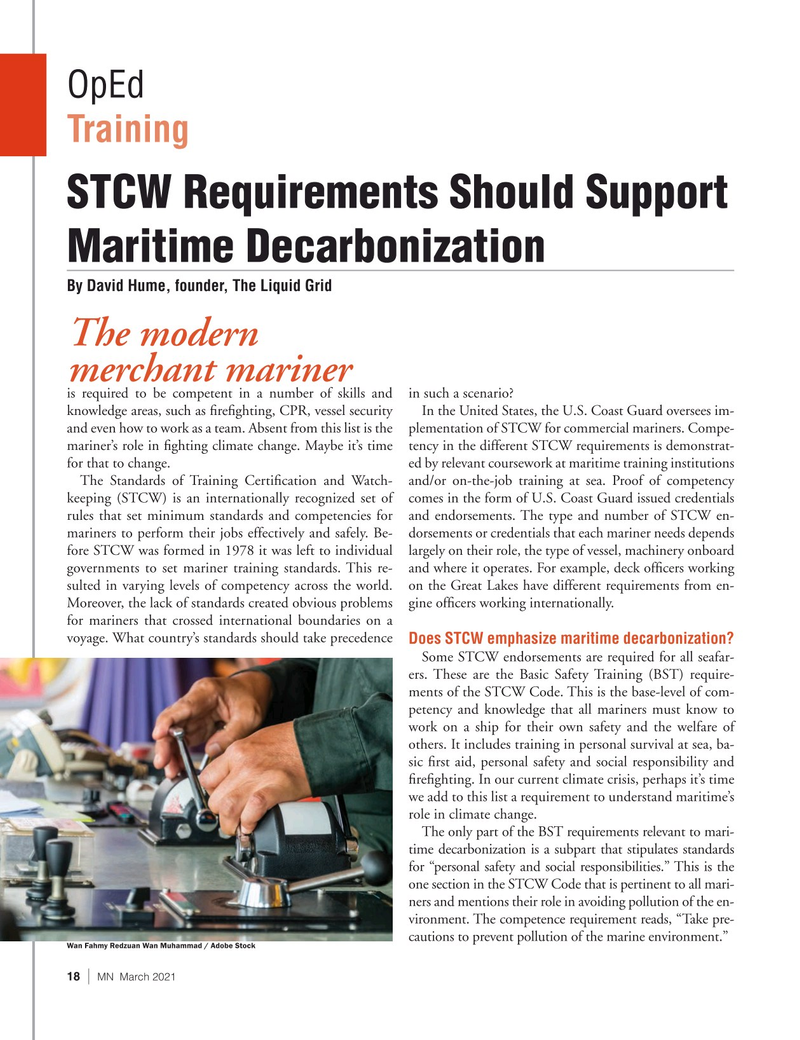
Page 18: of Marine News Magazine (March 2021)
Pushboats, Tugs & Barges
Read this page in Pdf, Flash or Html5 edition of March 2021 Marine News Magazine
OpEd
Training
STCW Requirements Should Support
Maritime Decarbonization
By David Hume, founder, The Liquid Grid
The modern merchant mariner is required to be competent in a number of skills and in such a scenario? knowledge areas, such as ? re? ghting, CPR, vessel security In the United States, the U.S. Coast Guard oversees im- and even how to work as a team. Absent from this list is the plementation of STCW for commercial mariners. Compe- mariner’s role in ? ghting climate change. Maybe it’s time tency in the different STCW requirements is demonstrat- for that to change. ed by relevant coursework at maritime training institutions
The Standards of Training Certi? cation and Watch- and/or on-the-job training at sea. Proof of competency keeping (STCW) is an internationally recognized set of comes in the form of U.S. Coast Guard issued credentials rules that set minimum standards and competencies for and endorsements. The type and number of STCW en- mariners to perform their jobs effectively and safely. Be- dorsements or credentials that each mariner needs depends fore STCW was formed in 1978 it was left to individual largely on their role, the type of vessel, machinery onboard governments to set mariner training standards. This re- and where it operates. For example, deck of? cers working sulted in varying levels of competency across the world. on the Great Lakes have different requirements from en-
Moreover, the lack of standards created obvious problems gine of? cers working internationally. for mariners that crossed international boundaries on a voyage. What country’s standards should take precedence
Does STCW emphasize maritime decarbonization?
Some STCW endorsements are required for all seafar- ers. These are the Basic Safety Training (BST) require- ments of the STCW Code. This is the base-level of com- petency and knowledge that all mariners must know to work on a ship for their own safety and the welfare of others. It includes training in personal survival at sea, ba- sic ? rst aid, personal safety and social responsibility and ? re? ghting. In our current climate crisis, perhaps it’s time we add to this list a requirement to understand maritime’s role in climate change.
The only part of the BST requirements relevant to mari- time decarbonization is a subpart that stipulates standards for “personal safety and social responsibilities.” This is the one section in the STCW Code that is pertinent to all mari- ners and mentions their role in avoiding pollution of the en- vironment. The competence requirement reads, “Take pre- cautions to prevent pollution of the marine environment.”
Wan Fahmy Redzuan Wan Muhammad / Adobe Stock 18 | MN March 2021

 17
17

 19
19
